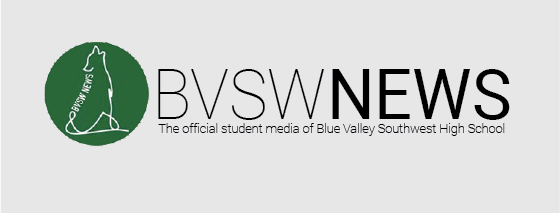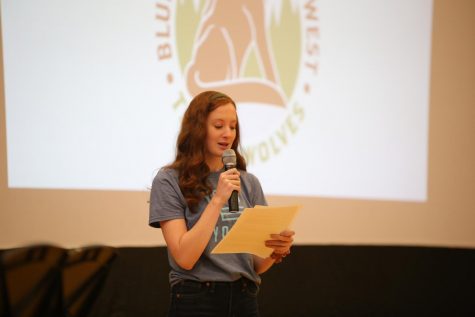Italian exchange student goes black and green
There really are people who have enough guts to travel from the other side of the world to Southwest to become a Timberwolf for the whole year. And of them is Federica Ferreri, 17, exchange student from Italy
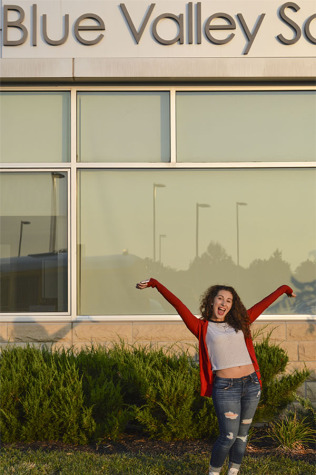
Exchange student Federica Ferreri being a happy timber wolf.
Above the opportunity to improve her language skills, Ferreri choose to go on an exchange year to grow, become more independent and to discover another culture.
JELLE BUIJS: Why did you choose to go to America instead of another country?
FEDERICA FERRERI: I think that America in Europe is something that you have every day. You’re surrounded by American music, food and movies, which make you think that you already know a lot about this country. I wanted to live the life of an American teenager so I could experience how life in the Sates exactly is and find out what’s and what’’not true about the image I had in mind of this culture beforehand.
JELLE BUIJS: What did you expected Southwest to be like?
FEDERICA FERRERI: When I was still in Italy, I expected it to be a very ‘American school’. I saw a lot of videos on youtube and thought that it was exactly like “High School Musical.” After my first day, I was already in love with this school. I met a lot of new people, everyone was so nice to me. The teachers said that they were always there to help me if I needed help. They all made me feel welcome.
JELLE BUIJS: What is the biggest difference between your old high school in Italy and South West?
FEDERICA FERRERI: In Europe we don’t have school spirit. In here, the school’s the center of the life of every teenager.
JELLE BUIJS: Do you think there are enough opportunities for exchange students to get involved in this school?
FEDERICA FERRERI: Definitely, there are a lot of (sport) clubs. It’s a great way to make new friends. Getting involved will make you feel a part of America. I’m in National Honor Society and KAY Club.I love those clubs.
If Federica has questions or need to talk to someone, she can go to our foreign exchange coordinator Kevin Halfmann.
JELLE BUIJS: What is the reason this school accepts exchange students?
KEVIN HALFMANN: Well, we don’t have a choice. There is a rule that says we have to take people from foreign countries. We don’t like them at all. ( He’s laughing. ) I’m just kidding, we are very open to the idea of having exchange students.
We are a very suburban, fairly homogenous, uniform kind of group of people here; middle class people. They come from the middle of the country. We need to hear other peoples points of view, as much as anybody here. If we can see the world a little bit through the eyes of somebody from wherever; this is good for our students, to be exposed to other cultures.
And it’s an hospitable thing to do. If someone would like to come to us to visit America, we would love to be kind enough to say ‘Yes, you are welcome to come to our school, it’s a nice place to be at.’
JELLE BUIJS: Do you mean that the people around this area are living in a bubble, and exchange students are kind of trying to get this bubble popped open?
KEVIN HALFMANN: I don’t know if I’ll would have used that exact words, but the fact that we’re in the middle of the country in the midwest, and that we are mostly white, and we’re mostly middle-classed, means that we have a point of view. And it would be no different if we would be in Nebraska, or Texas or Arizona, we all come from a point of view from where we live. And whenever we’re exposed to other points of view, it’s enlightening to have someone coming in who says ‘O, this is how I see the world, this is how we think about the world where I am from. ‘
It’s an instructive thing. It doesn’t mean the bubble per se here. Some people like to use that term. And I don’t think having exchange students here changes all of that, if it exist in the first place, it’s anyone of us.
JELLE BUIJS: What does this high school expects from the exchange students?
KEVIN HALFMANN: To follow the rules that exist in our building, to interact with other people and be able to speak English well enough to communicate. And most important: to have a good time here.
This is not about them to earn high school credit, this about coming and having an experience and be aware of who we are.
We want people to be involved, we want our exchange students to be part of things in our school. In my experience, they have been well liked and well accepted people. They have a little accent. We Americans are suckers for an accent.
In general, I think our students tend to be very friendly and very polite and have very good manners. So I think the foreign exchange students are typically treated very well when they come here.
JELLE BUIJS: Do you think the exchange students inspire the other students on this school to think more international?
KEVIN HALFMANN: I’d like to think that that would happen, but I haven’t seen it yet. There are barriers to do that. I think part of the American psyche is ‘Let’s get it done, and let’s go.’’ We tend to have a hard time slowing down and say ‘let’s go experience something’.
Ale Griffith is a senior at our school. How do exchange students affect her life?
JELLE BUIJS: What was the first moment you got in contact with an exchange student at Southwest?
ALE GRIFFITH: It was my first day at tennis try-outs, and there was this new girl from Spain called Esther.
JELLE BUIJS: What do you think life is at this school for an exchange student?
ALE GRIFFITH: I think when they first get here, they might get overwhelmed. It’s probably a big different then the high school in their own country: the size of South West, a lot of people they don’t know and a language which is kind of foreign to them. Maybe school can be a little hack tick and stressful at the beginning. But once they get in the rhythm of their classes it’s easier to find their way around, and once they meet the people in their classes, those kind of people become their friends.
JELLE BUIJS: Do exchange students let you think more international?
ALE GRIFFITH: Definitely. I think cause we’re constantly in an environment with other Americans, that have a lot in common with you, you don’t really think about anything outside your school. When an exchange student comes in your class, it’s gonna happen..they’re going to talk about their own country. And that way other people can learn about them and a lot about the culture where they come from.
It makes people think on a more bigger spectrum.
JELLE BUIJS: Do you think it will change the way you’ll schedule your future? For example: maybe you’d go abroad sooner because you got in contact with all kind of international students?
ALE GRIFFITH: When I meet exchange students, I start to wonder how it will be in their country. And I think that would be a good reason to study abroad; to see where all this people are coming from. And have the experience that they have in their own country.
If you ever worried about being in a different culture than yours and then seeing an exchange student doing` that, would definitely make you think that’s it’s possible for you to do it too.
David Myers has been a host-parent of several students who went to BVSW.
DAVID MYERS: All of our students have enjoyed Blue Valley Southwest, they have founded it to be welcoming. The students and staff have always been friendly.
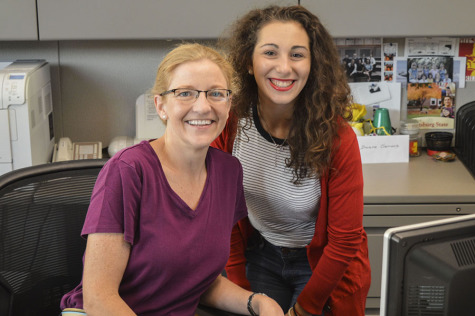
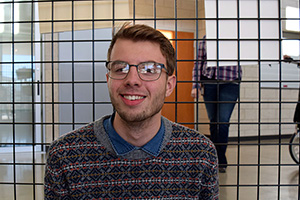
Jelle Buijs is a senior and exchange student from the Netherlands. Besides visiting all kinds of museums and lunch rooms, he enjoys taking walks, collecting...
